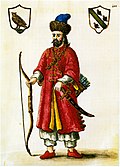Marco Polo
Marco Polo (September 15, 1254 – January 8, 1324) was a Venetian merchant, explorer, and writer who travelled through Asia along the Silk Road between 1271 and 1295. His travels are recorded in The Travels of Marco Polo, a book that described to Europeans the then mysterious culture and inner workings of the Eastern world, including the wealth and great size of the Mongol Empire and China in the Yuan Dynasty, giving the first comprehensive look into China, Persia, India, Japan and other Asian cities and countries.
Early life[edit]
Marco Polo was born in Venice, Italy. The exact date and place of his birth are archivally unknown. Some historians mentioned that he was born on September 15, 1254, but that date is not endorsed by mainstream scholarship. Marco Polo's father, Niccolò Polo, a merchant, was not at home at the time of Marco's birth, having left in 1260 on a long-term trading trip to Asia.
Travels[edit]
In 1271, Niccolò and his brother Maffeo Polo returned to Asia with the young Marco. They travelled overland along the Silk Road, and were among the first Europeans to travel the trade route. They passed through much of Asia, and met with Kublai Khan, a Mongol ruler and founder of the Yuan Dynasty.
Later life and death[edit]
After returning to Venice in 1295, Marco Polo was captured and imprisoned by the Genoese, who were then at war with Venice. While in prison, he dictated his stories to a cellmate, Rustichello da Pisa, who turned them into the book The Travels of Marco Polo. Marco Polo was released in 1299, returned home to Venice, and died in 1324.
Legacy[edit]
Marco Polo's travels have since inspired many explorers. Including Christopher Columbus, who kept a copy of Polo's book with him on his voyages. In a broader sense, Marco Polo introduced Europeans to Central Asia and China.
This exploration related article is a stub. You can help WikiMD by expanding it.
-
Marco Polo
-
Marco Polo
-
Marco Polo
-
Marco Polo
-
Marco Polo
-
Marco Polo
-
Marco Polo
-
Marco Polo
-
Marco Polo
-
Marco Polo
-
Marco Polo
-
Marco Polo
Ad. Transform your life with W8MD's Budget GLP-1 injections from $49.99


W8MD offers a medical weight loss program to lose weight in Philadelphia. Our physician-supervised medical weight loss provides:
- Weight loss injections in NYC (generic and brand names):
- Zepbound / Mounjaro, Wegovy / Ozempic, Saxenda
- Most insurances accepted or discounted self-pay rates. We will obtain insurance prior authorizations if needed.
- Generic GLP1 weight loss injections from $49.99 for the starting dose of Semaglutide and $65.00 for Tirzepatide.
- Also offer prescription weight loss medications including Phentermine, Qsymia, Diethylpropion, Contrave etc.
NYC weight loss doctor appointmentsNYC weight loss doctor appointments
Start your NYC weight loss journey today at our NYC medical weight loss and Philadelphia medical weight loss clinics.
- Call 718-946-5500 to lose weight in NYC or for medical weight loss in Philadelphia 215-676-2334.
- Tags:NYC medical weight loss, Philadelphia lose weight Zepbound NYC, Budget GLP1 weight loss injections, Wegovy Philadelphia, Wegovy NYC, Philadelphia medical weight loss, Brookly weight loss and Wegovy NYC
|
WikiMD's Wellness Encyclopedia |
| Let Food Be Thy Medicine Medicine Thy Food - Hippocrates |
Medical Disclaimer: WikiMD is not a substitute for professional medical advice. The information on WikiMD is provided as an information resource only, may be incorrect, outdated or misleading, and is not to be used or relied on for any diagnostic or treatment purposes. Please consult your health care provider before making any healthcare decisions or for guidance about a specific medical condition. WikiMD expressly disclaims responsibility, and shall have no liability, for any damages, loss, injury, or liability whatsoever suffered as a result of your reliance on the information contained in this site. By visiting this site you agree to the foregoing terms and conditions, which may from time to time be changed or supplemented by WikiMD. If you do not agree to the foregoing terms and conditions, you should not enter or use this site. See full disclaimer.
Credits:Most images are courtesy of Wikimedia commons, and templates, categories Wikipedia, licensed under CC BY SA or similar.
Translate this page: - East Asian
中文,
日本,
한국어,
South Asian
हिन्दी,
தமிழ்,
తెలుగు,
Urdu,
ಕನ್ನಡ,
Southeast Asian
Indonesian,
Vietnamese,
Thai,
မြန်မာဘာသာ,
বাংলা
European
español,
Deutsch,
français,
Greek,
português do Brasil,
polski,
română,
русский,
Nederlands,
norsk,
svenska,
suomi,
Italian
Middle Eastern & African
عربى,
Turkish,
Persian,
Hebrew,
Afrikaans,
isiZulu,
Kiswahili,
Other
Bulgarian,
Hungarian,
Czech,
Swedish,
മലയാളം,
मराठी,
ਪੰਜਾਬੀ,
ગુજરાતી,
Portuguese,
Ukrainian











